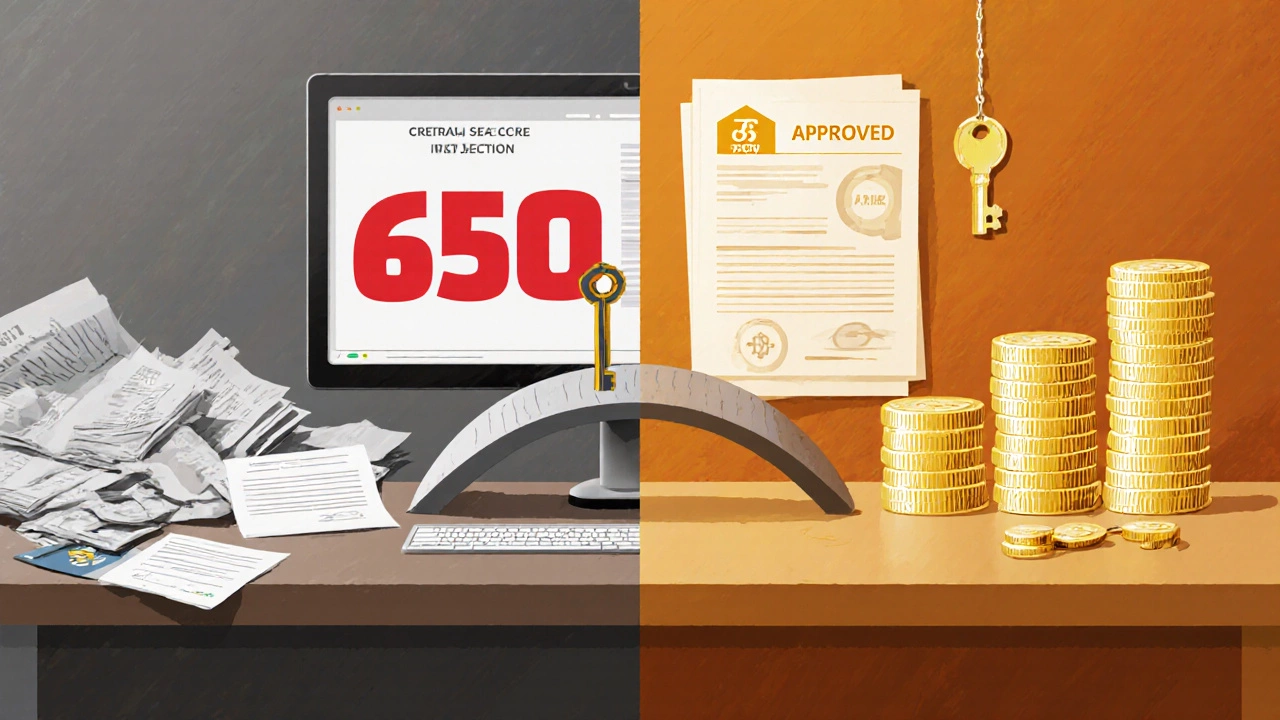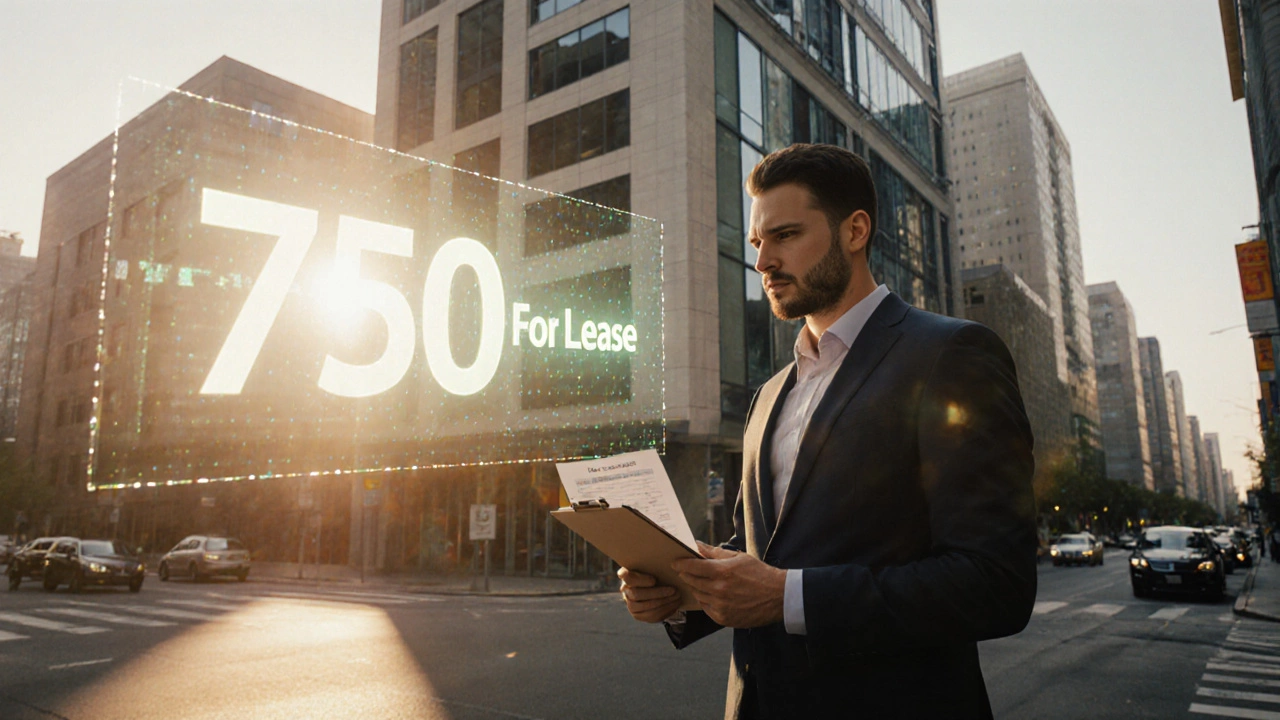Commercial Property Loan Calculator
Loan Eligibility Calculator
Credit Score Guide
Your credit score significantly impacts your commercial loan eligibility:
Estimated Loan Terms
Your results will appear here
Important: This calculator provides estimates only. Actual loan terms depend on multiple factors including your debt-to-income ratio, cash reserves, business plan, and property type.
Buying commercial property isn’t like buying a home. You’re not just looking at three bedrooms and a backyard-you’re investing in income, cash flow, and business potential. But before you even look at a single storefront or warehouse, lenders will look at one thing above all else: your credit score.
There’s no magic number like the 620 you might need for a home loan. Commercial lending is stricter, more complex, and less forgiving. If your credit score is below 680, you’re already fighting an uphill battle. Most banks and institutional lenders want to see 700 or higher before they’ll even consider your application.
Why so high? Because commercial properties are riskier. A single tenant vacating a retail space can wipe out your cash flow overnight. Lenders know this. They don’t just look at the building-they look at you. And your credit score is their first snapshot of your reliability.
Why Credit Score Matters More Than You Think
Your credit score isn’t just a number on a page. It’s a signal to lenders about how you handle money. A 750 score tells them you pay bills on time, keep debt low, and don’t take on more than you can handle. A 650 score? It says you’ve missed payments, carried high balances, or opened too many accounts too fast.
Commercial lenders don’t just want to know you can repay the loan-they want to know you’ll stay calm when things get tough. A tenant leaves. Repairs cost more than expected. Interest rates rise. If you’ve shown financial discipline in your personal life, they’re more likely to believe you’ll manage the business side of the property too.
Some investors think they can skip personal credit by using a company structure. That’s a myth. Most lenders still require a personal guarantee, especially for small to mid-sized deals under $5 million. Even if you have an LLC, your credit score still matters.
What Credit Score Do You Actually Need?
Here’s the reality check:
- 700-749: You’ll qualify for some commercial loans, but expect higher interest rates and stricter terms. You’ll need strong cash reserves and solid business plans.
- 750-799: This is the sweet spot. You’ll get better rates, longer amortization periods, and more flexible down payment options.
- 800+: You’re in the top tier. Lenders compete for you. You might get 20-25% down payments, 25-year terms, and even interest-only periods.
- Below 680: Very few traditional lenders will approve you. You’ll need to turn to private lenders or hard money loans-which come with rates of 10% or more and short terms (1-3 years).
These aren’t hard rules, but they’re the patterns you’ll see across Australia’s major banks-Commonwealth Bank, Westpac, ANZ, NAB-and their commercial lending arms. Regional lenders and credit unions might be slightly more flexible, but they still follow the same general standards.
Other Factors That Matter Just as Much
Yes, credit score is king-but it’s not the only king. Lenders look at the whole picture:
- Debt-to-income ratio: Your total monthly debt payments divided by your gross income. Lenders want this under 43%. If you’re carrying car loans, personal loans, or credit card balances, they’ll count against you.
- Cash reserves: How much liquid cash do you have after closing? Most lenders want 6-12 months of mortgage payments, property taxes, insurance, and maintenance costs sitting in the bank.
- Business plan: Are you renting it out? Running a business from it? Lenders want to see a realistic rental income projection, signed leases, or a clear path to profitability.
- Property type: A medical office building with long-term tenants? That’s low risk. A strip mall with five small businesses? That’s high risk. The property itself affects the credit score you need.
- Down payment: The bigger your down payment, the more forgiving lenders can be. If you’re putting down 40%, they might accept a 680 score. If you’re only putting down 20%, they’ll demand 740+.
One investor I know in Brisbane had a 692 score but put 50% down on a warehouse with a 10-year lease from a national logistics company. He got approved. Why? The property was the star, not his credit. But that’s the exception, not the rule.

How to Improve Your Credit Score Fast
If your score is below 700 and you’re serious about buying commercial property, don’t wait. Start fixing it now. Here’s what works:
- Pay every bill on time. Late payments hurt more than anything else. Set up automatic payments for credit cards, utilities, and loans.
- Reduce credit card balances. Aim to use less than 30% of your available credit. Paying down a $5,000 balance to $1,000 can boost your score by 50+ points in 30 days.
- Don’t open new accounts. Every hard inquiry knocks a few points off. Avoid applying for new credit cards or loans for at least six months before applying for a commercial loan.
- Check your credit report. Errors happen. In Australia, you can get free reports from Equifax and Experian. Dispute anything inaccurate-like old debts that aren’t yours or duplicate entries.
- Keep old accounts open. The length of your credit history matters. Even if you don’t use an old credit card, keep it active with a small monthly charge you pay off right away.
It takes time, but if you’re disciplined, you can raise your score 50-100 points in 4-6 months. That could mean the difference between getting approved or being turned down.
What If You Don’t Have a Good Credit Score?
You’re not out of options-but you’re in a harder lane.
- Find a co-signer. If a family member or business partner has a strong credit score and income, they can guarantee the loan. But they’re legally responsible if you default.
- Use private lenders. These are non-bank lenders who focus on the property, not your credit. They charge 10-15% interest and require 30-40% down, but they can close in 2-4 weeks.
- Buy with partners. Pool resources with someone who has better credit. Structure the deal as a joint venture. You manage the property; they handle the financing.
- Start smaller. Buy a small retail unit or a single-tenant building under $1 million. These are easier to finance, and you can build equity before moving to larger deals.
One investor in Melbourne bought a 100-square-metre shop with a 675 score using a private lender. He paid 12% interest, but he got the property. He improved his credit over the next two years, refinanced with a bank at 6.5%, and doubled his equity. That’s the path.

Real-World Example: Sydney Retail Unit
Last year, a client in Sydney wanted to buy a small retail unit in Bondi Junction. He had a 710 score, $180,000 in savings, and a signed lease from a pharmacy chain for $45,000/year. The property was priced at $850,000.
He put down 35% ($297,500). The bank approved him for a 20-year term at 7.2% interest. His monthly payment? Around $4,800. The rental income covered it-with $2,000 left over.
His credit score wasn’t perfect, but it was strong enough. His cash reserves were solid. His tenant was reliable. The property made sense. That’s what lenders look for.
Bottom Line: Credit Is Your Foundation
Commercial property isn’t about getting rich quick. It’s about building long-term wealth through smart, disciplined decisions. Your credit score is the first gatekeeper. If it’s weak, you’ll pay more, wait longer, and get fewer options.
Don’t rush into a deal just because you found a good property. Fix your credit first. Build your savings. Get your finances in order. Then, when you’re ready, you won’t just qualify-you’ll have leverage. You’ll walk into the lender’s office as someone they want to work with, not someone they’re trying to protect themselves from.
Commercial property rewards patience. The best deals go to those who prepare-not those who rush.
Can you buy commercial property with a 650 credit score?
It’s extremely difficult with traditional lenders. Most banks require at least a 680 minimum, and even then, you’ll need a large down payment and strong cash reserves. With a 650 score, your only realistic options are private lenders or hard money loans, which charge higher interest (10-15%) and require 30-40% down. These loans are short-term (1-3 years) and meant for fixing credit or improving the property before refinancing.
Does business income count for commercial property loans?
Yes, but it’s complicated. Lenders will look at your business’s tax returns, bank statements, and profit-and-loss statements. If you’re self-employed, you’ll need at least two years of consistent income. Some lenders will use your business income to offset lower personal income, but they’ll still require a personal guarantee and strong personal credit. The stronger your business cash flow, the more flexibility you’ll have.
How much down payment do you need for commercial property?
Typically, you’ll need 20-30% down for a standard commercial property. With excellent credit (760+), you might get away with 15-20%. With weaker credit or riskier property types, lenders may require 35-40%. The higher your down payment, the better your loan terms and the more forgiving lenders are about your credit score.
Do you need a business license to buy commercial property?
No, you don’t need a business license to purchase commercial property. But if you plan to operate a business from it, you’ll need one for zoning and legal reasons. Lenders don’t require it for the loan, but they do want to see how the property will generate income-whether through leases, your own business, or both. Having a registered business can help prove income stability, especially if you’re self-employed.
Can you use superannuation to buy commercial property?
Yes, but only through a Self-Managed Super Fund (SMSF). You can’t use your regular super account. An SMSF can buy commercial property, but it must be for investment purposes only-you can’t use it for personal business unless it’s leased to your business at market rates. There are strict rules around borrowing within SMSFs, and you’ll still need strong personal credit for the loan guarantee. It’s a complex route, so professional advice is essential.
If you’re serious about commercial property, start by checking your credit report today. Get your numbers in order. Build your savings. Talk to a commercial mortgage broker who knows the local market. The right property will wait. Your credit score won’t fix itself.

